Fall 2025
Scroll down this page to take a look at the various HON course options.
HON 3143.H01 Honors Interdisciplinary Seminar in Social Science
The Evolving Landscape of Women’s Sports: Opportunities and Obstacles
By some metrics, women’s sport is thriving –participation numbers have risen, cultural supports have grown, and viewership and public visibility are high. At the same time, women athletes face challenges both continued and new, from a lack of mainstream media attention to a dearth of protective and supportive policies to harassment via social media. How can we understand the contemporary and evolving status of women in sport, and how does this vary by sport type and for groups of women across race, class, and sexuality? This course will draw from sociological theory and research to examine women in a variety of sports across collegiate, semi-professional, and professional contexts, examining topics such as the development of opportunities, current resource and policy landscapes, player and fan activisms, and the role of social media and digital technologies for women’s sport. Rachel Allison, PhD, Associate Professor Department of Sociology
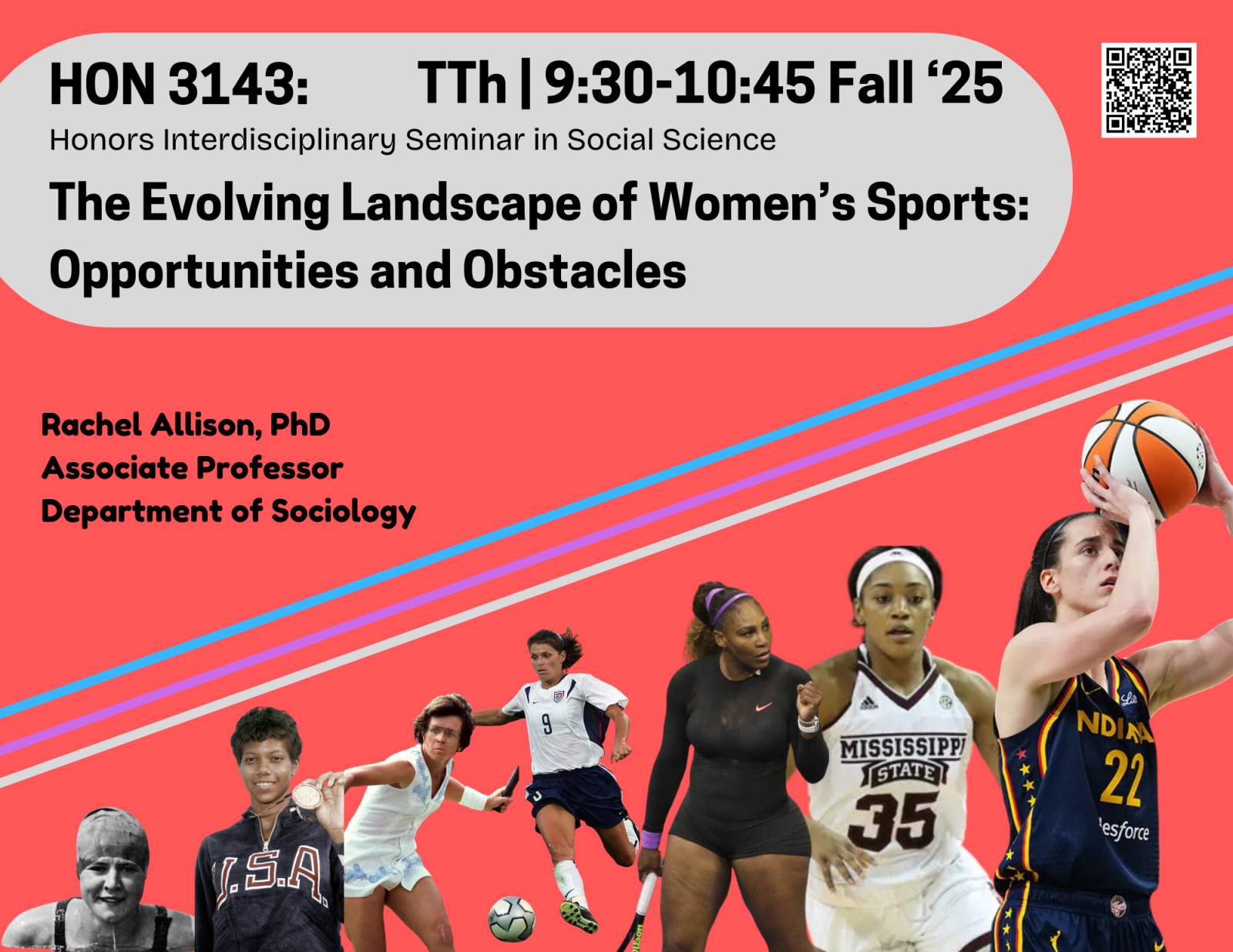
HON 3163.H02 Honors Interdisciplinary Seminar in Natural Science
Climate Change and Health
This course explores the interconnectedness of climate change and public health, examining how warming temperatures and changing climatic conditions affect various aspects of human health. Topics include the impacts of temperature extremes, air and water quality, vector-borne diseases, mental health, food security, and the long-term health effects of natural disasters. It also addresses vulnerable populations, climate adaptation and mitigation strategies, and policy evaluation. Students will gain an understanding of the global health risks posed by climate change, as well as the social determinants that influence health outcomes. By the end of this course, students will be equipped to assess health risks, propose solutions, and advocate for policies that protect human health in a changing climate. Aswathy N. Rai, Ph.D., MPPA (she/her/hers), Assistant Teaching Professor and Undergraduate Coordinator (Biochemistry)
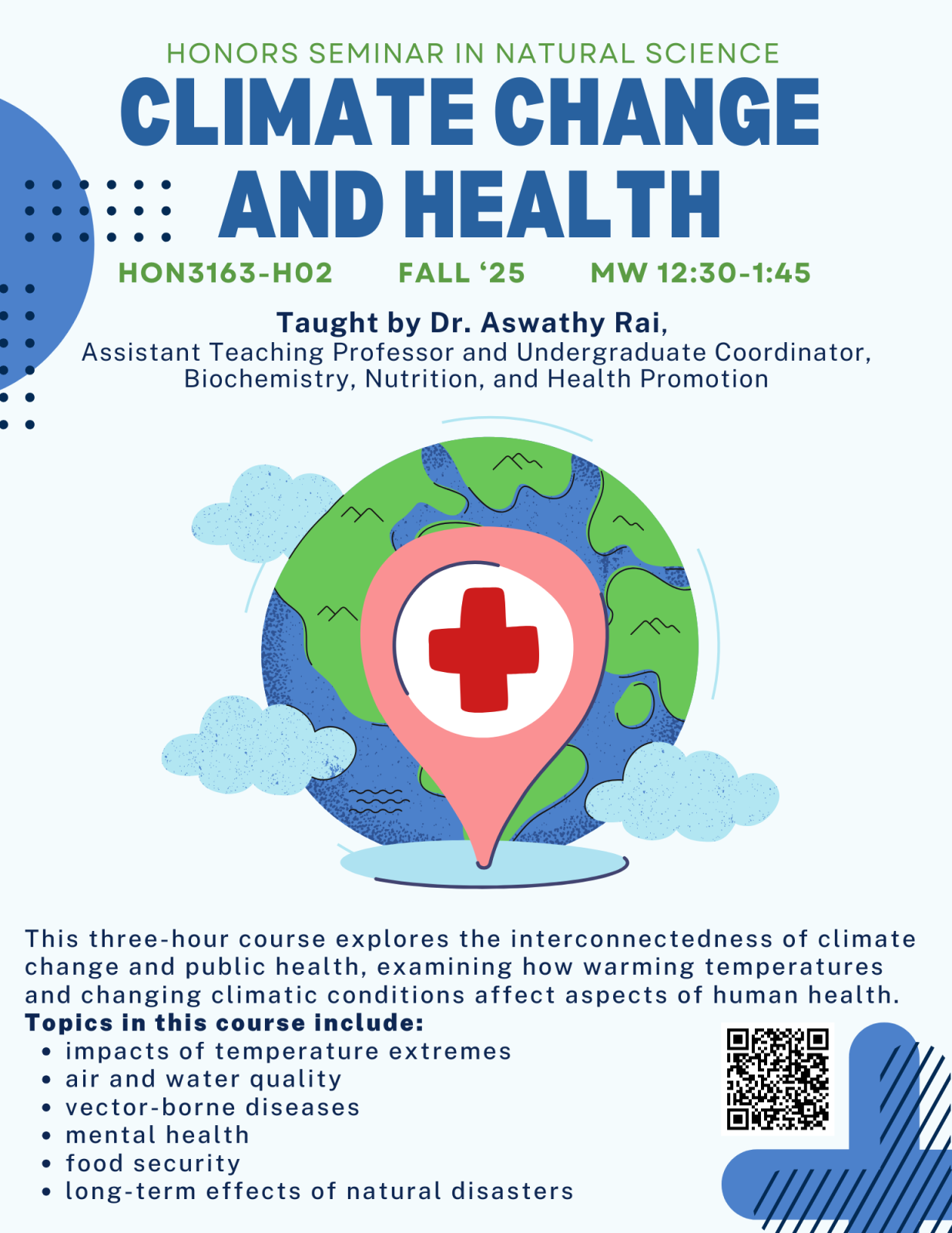
HON 3173-H01: Honors Interdisciplinary Seminar in Fine Myths, Legends, and Stories: Discovering the Ancient World through Films, Plays, and Musicals
TTH 11:00 - 12:15
This seminar course is designed for students to read selected plays and literary works from the ancient world, to watch representative films based on ancient myths, legends, and stories, and to create active research in the discovery of how these civilizations have made, and will continue to make, an enduring impact on contemporary society. Tales of adventure, power, war, revenge, lust, jealousy, and love continue to play huge roles in how we live our lives as a society today and what we continue to enjoy as entertainment. Through class discussions, readings, films, presentations, and projects, students will reach a greater understanding of the significance in the historical, social, cultural, political, and philosophical influences of the ancient world as well as analyze entertainment values through representative films, plays, and literary works; identify distinct features of film and play productions and the importance of literary works; and participate in research projects as it pertains to a film, a play, or a literary work.
Taught by Dr. Donna Clevinger, Senior Faculty Fellow and Professor, Shackouls Honors College
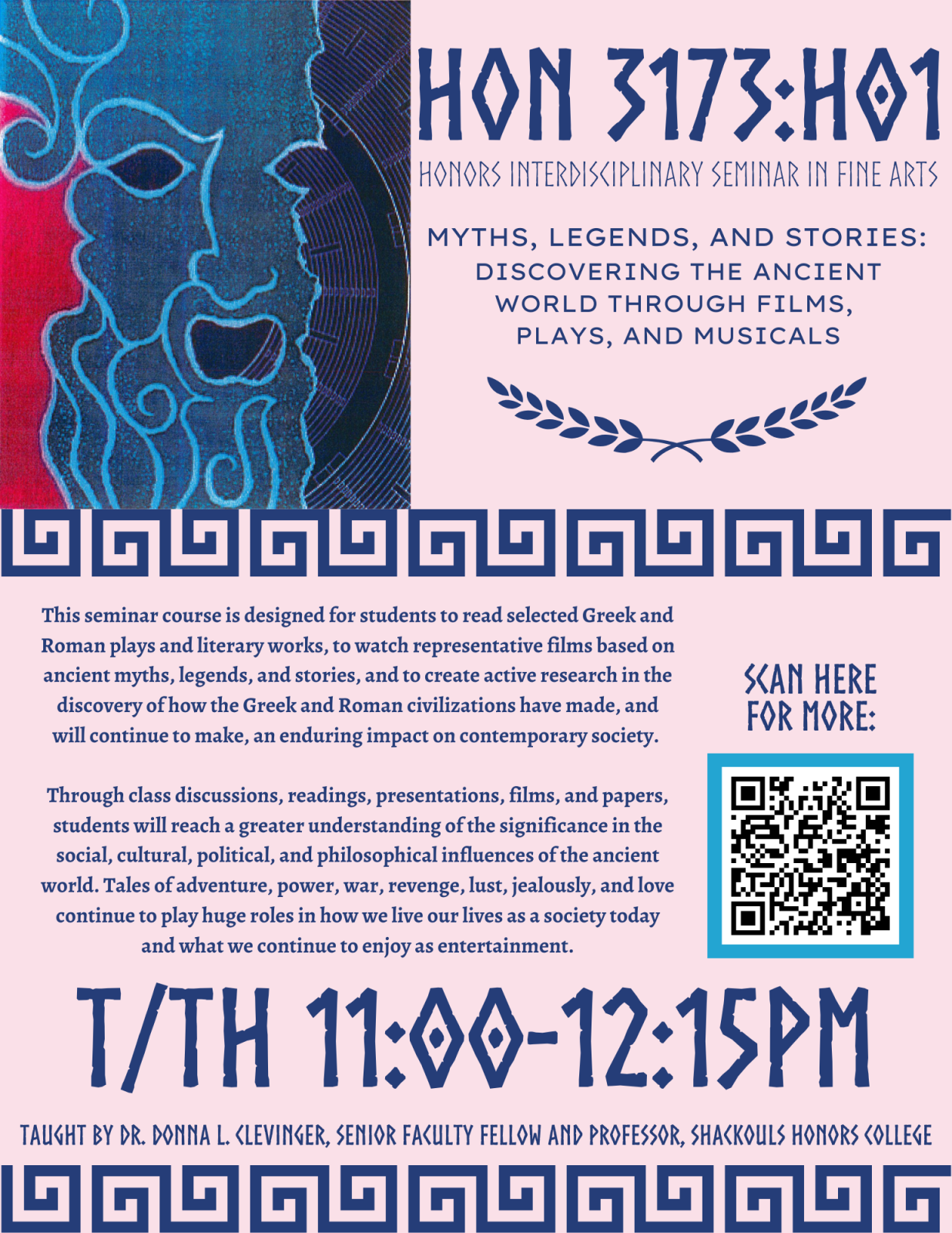
HON 3183.H01 Honors Interdisciplinary Seminar in Humanities
The World of J.R.R Tolkien
TR 2:00-3:15
This Honors course explores the writings (popular and academic) of J.R.R. Tolkien and the Tolkien phenomena which have emerged since the 1960s. We will also examine the medieval history, material culture, and literature which inspired Prof. Tolkien both as a scholar and as the architect of Middle-earth.
Taught by: Dr. Chris Snyder, Professor, Shackouls Honors College
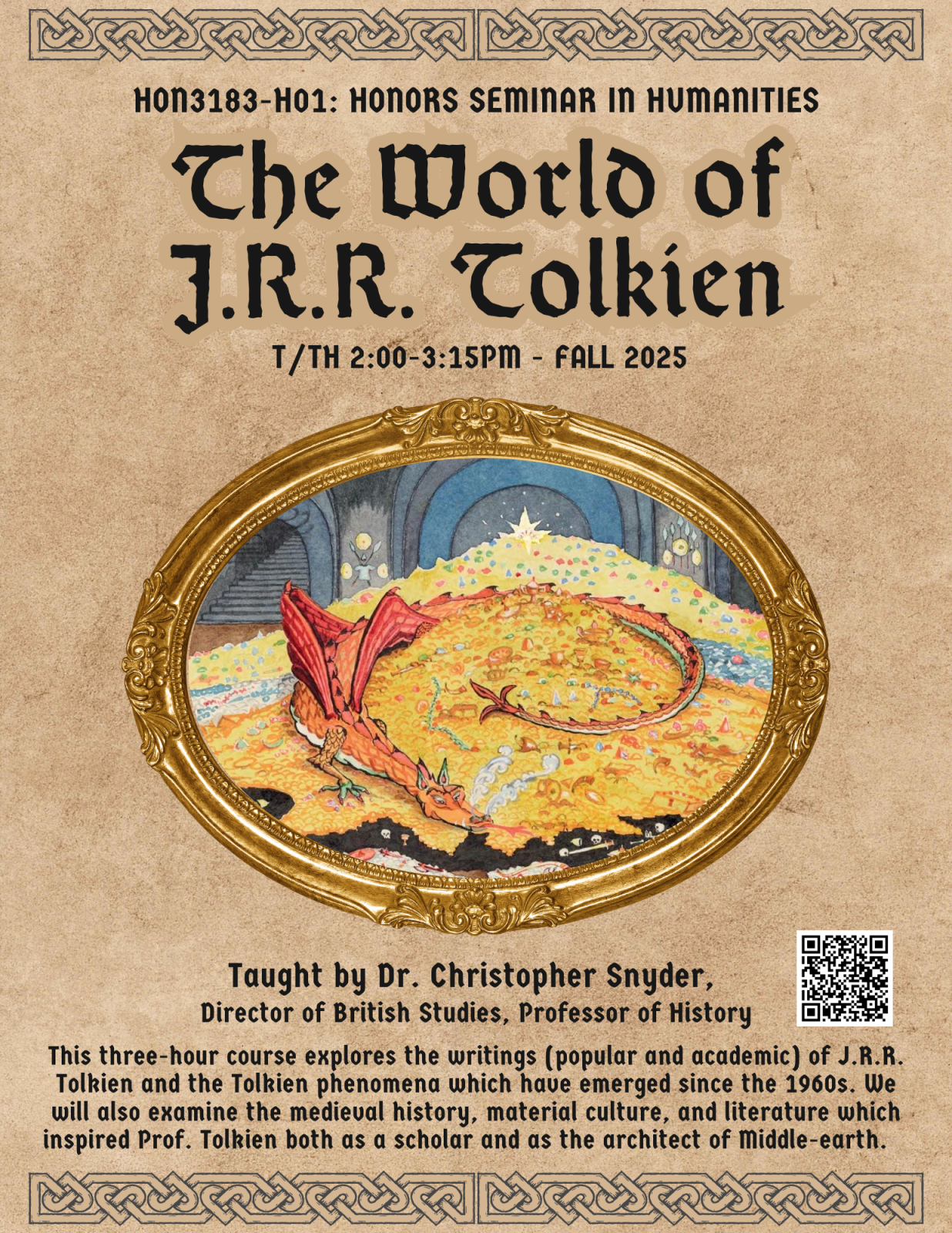
HON 3183.H02 Honors Interdisciplinary Seminar in Humanities
Quest 3: Dialogues and the Quest for Meaning Across the World
MW 2:00-3:15
This course will continue and deepen the study of literary, philosophical, religious and political texts from the Ancient World to the present that you may have already experienced in the Quest 1 and Quest 2 courses. It will also be wider in its scope. Whereas the Quest courses concentrate mainly on works and authors from Europe and "the West" (however that might be defined precisely!), and what are seen as its precursors in Classical Greece and Rome, this HON 3183 seminar will also give much more attention to other cultures and regions of the world - including some that have often been unjustly neglected, and relegated to the sidelines of "world civilization". So, for example, we will be studying myths and stories from Pacific Islander, Native American, sub-Saharan African and Australian Aboriginal cultures. (We'll spend some time thinking about what terms such as "myths" and "stories" might actually mean!) Equally, we will read some of the earliest Buddhist scriptures, and world-famous works of Chinese, Japanese and Latin American literature. Throughout the course, we will emphasize the importance of studying "non-European", "non-Western" cultures in their own right - and not merely how they have responded to Western political, military and cultural encroachments.
Taught by Dr. Matthew Peaple, Assistant Teaching Professor, Shackouls Honors College
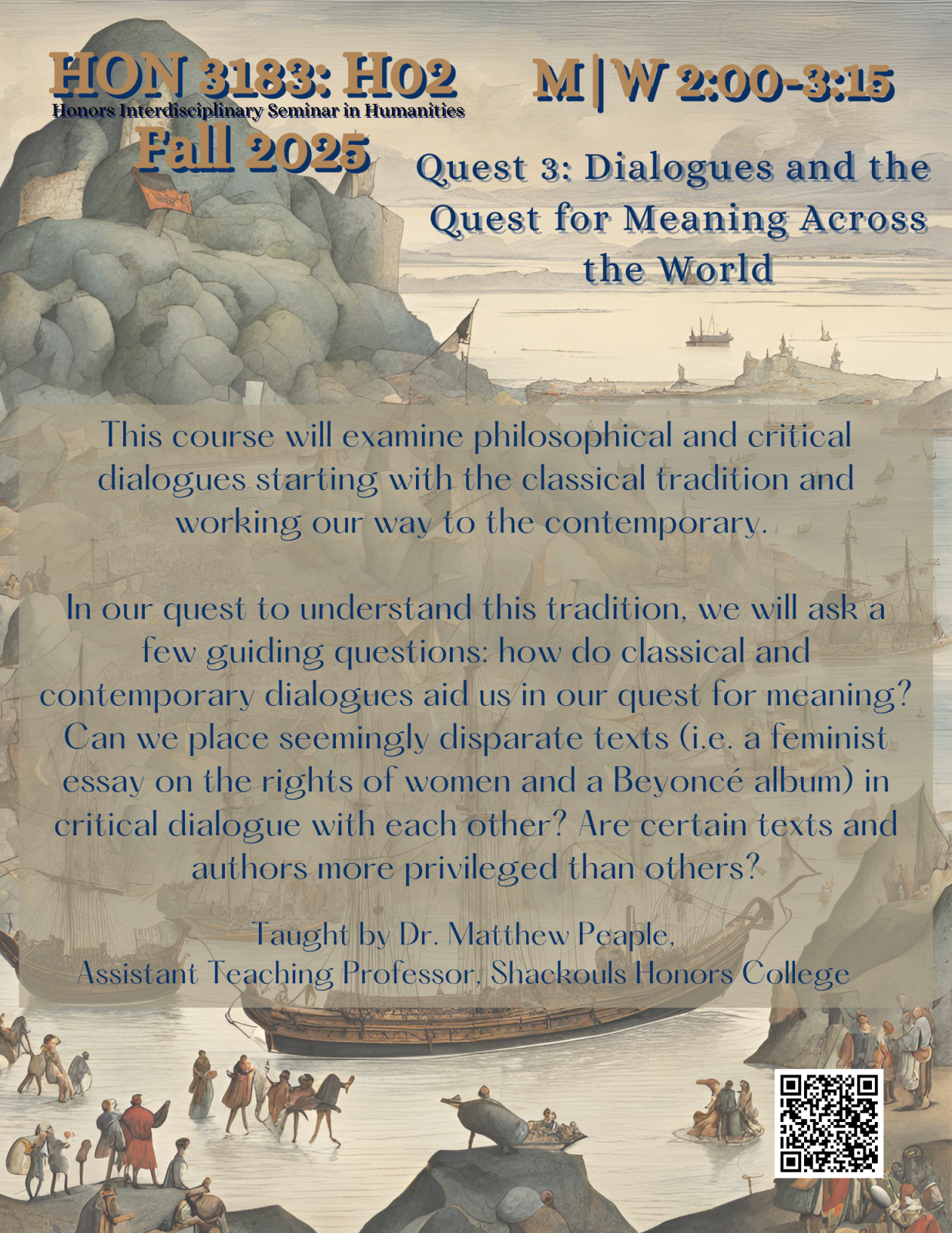
CO 1503 H01 Honors Introduction to Theatre
TTh 12:30-1:45
Taught by Dr. Donna Clevinger, Senior Faculty Fellow and Professor, Shackouls Honors College
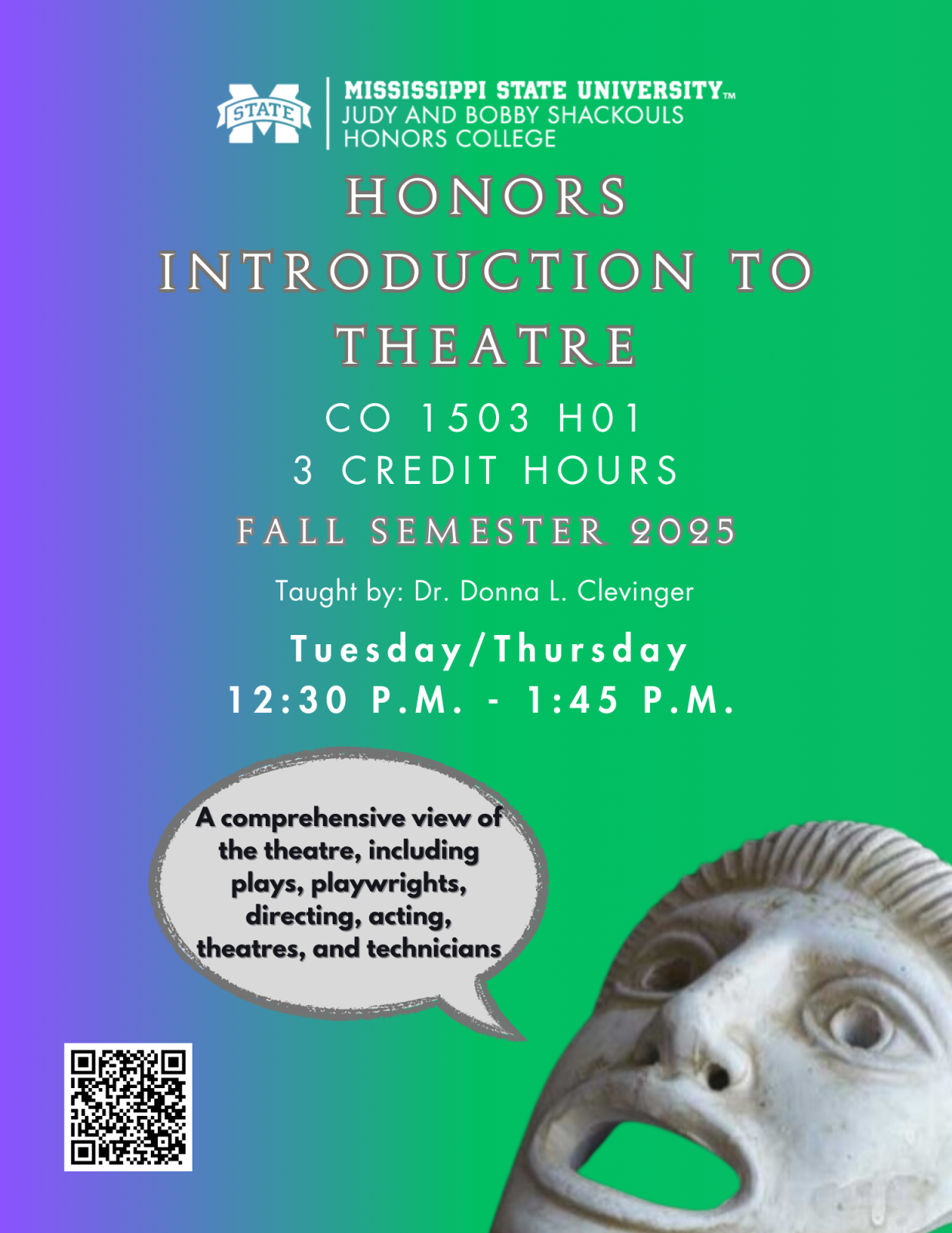
EN 2203.H01 Honors Introduction to Literature
TTh 2:00 - 3:15
Taught by Dr. Kelly Marsh, Professor, Department of English
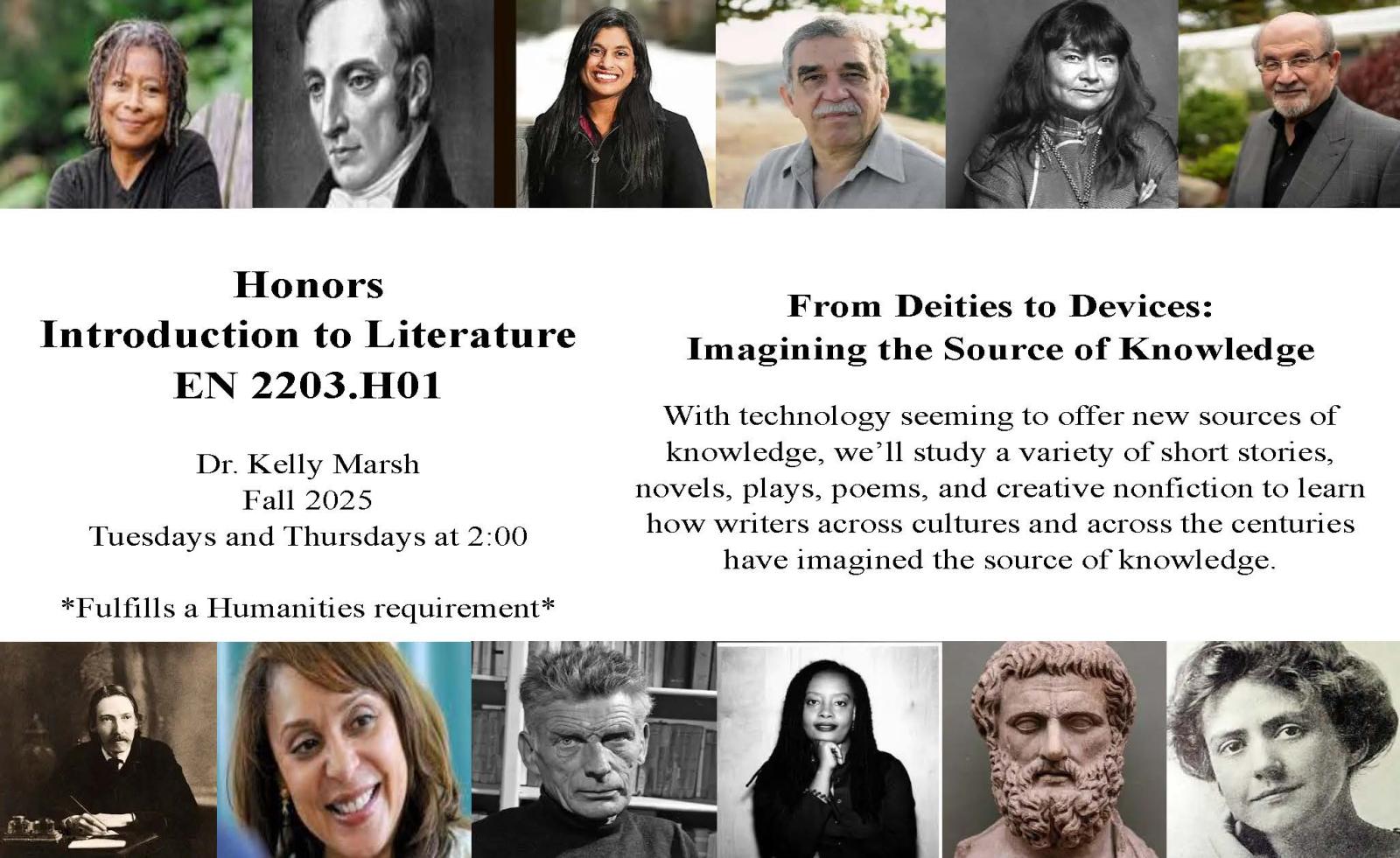
HON 2091-H01: Honors Forum IV
Non-Profit Organizations in Society
M 11:00-11:50am
Non-Profit Organizations in Society will investigate how governments are relinquishing some of their duties to non-profit organizations and individuals/groups in society. This course will specifically look at non-profit strategy and governance to better explain how organizations are used to deal with society’s social ills. Additionally, this course will help provide students with an opportunity to learn and apply skills needed to lead and govern an existing non-profit organization or how to start their own non-profit. Students will learn how to apply for 501(c)(3) status, craft mission statements, best recruit board members, structure committees, and how to effectively run meetings to ensure oversight and effective leadership. Lastly, students will have the opportunity to meet with executive directors of multiple non-profit organizations to discuss the pros and cons of leading and governing their non-profit organizations.
Taught by Dr. Brian Pugh, Executive Director, Stennis Center for Public Service
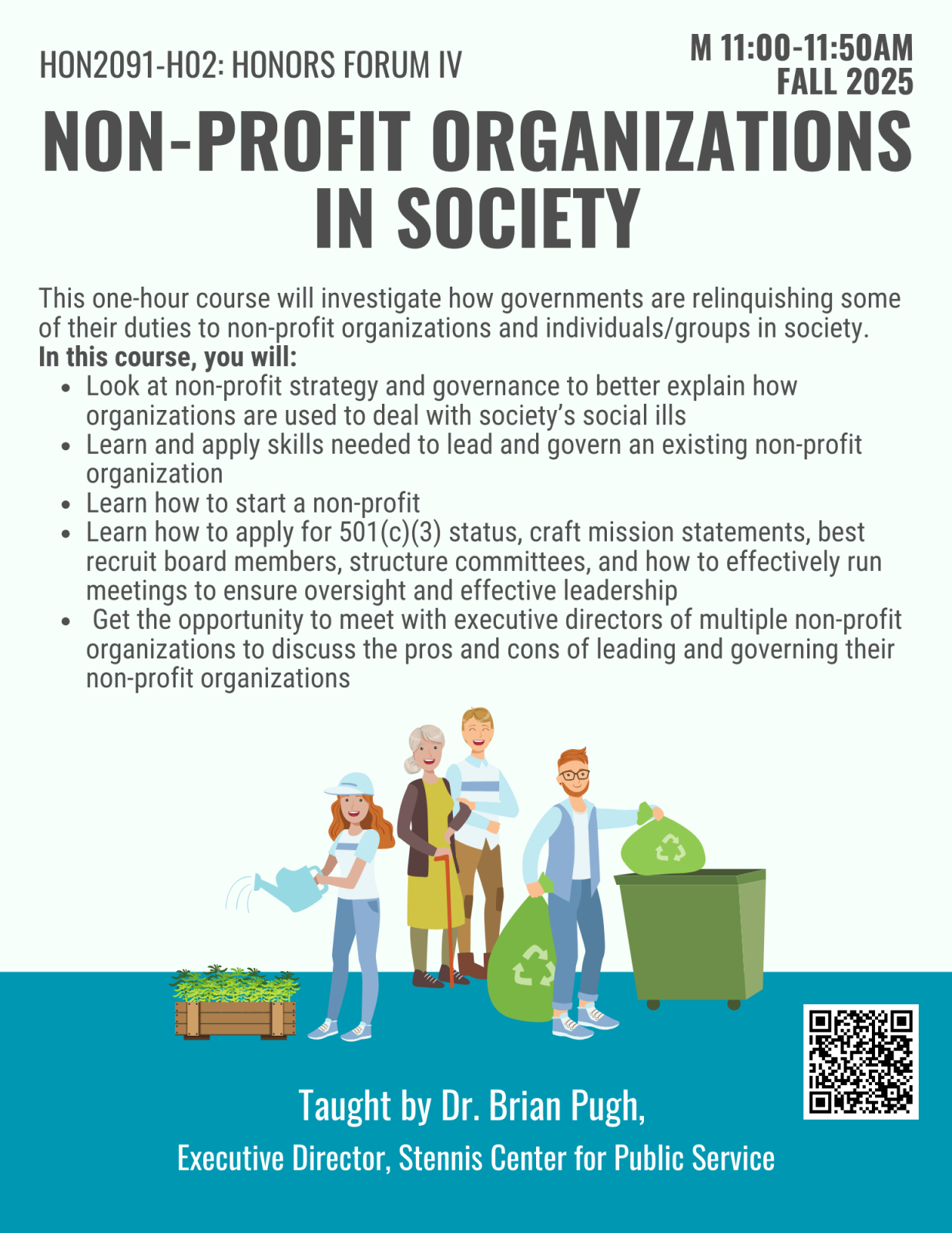
HON 2091-H02: Honors Forum IV
National Fellowships
W 11:00-11:50am
What is a national fellowship? Why should I care? I want to be a doctor, so the Rhodes Scholarship is not for me? There is no way I can win a national fellowship like the Gates Cambridge. I’m too busy to write yet another personal statement for a fellowship. All those fellowships go to Ivy League kids. They won’t respect MSU and Mississippi, so why bother? My advisor thinks I should just go on to graduate school. I’m a STEM student, and all of those fellowships go to English or history majors.
In my seven years of mentoring students for nationally competitive scholarships and fellowships, I have heard some version of just about all of these statements or questions. The purpose of this seminar is to enable students to get beyond these false, self-limiting assumptions about national fellowships. In this seminar, students will learn about many of the most prominent fellowships for undergraduates who want to pursue graduate school, who want to explore the world, who want to master a second language or who want to be a change agent in their community, region, and nation. Students will learn the requirements of these fellowships and begin to develop the necessary skills to apply. My hope is that each student who participates in this fellowship seminar begins to view the process of applying for fellowships such as the Rhodes, Truman, Fulbright, or the Goldwater as a challenge that can amplify the college experience and make them better applicants for graduate school, professional school, or job candidates. Especially For Sophomore and Juniors.
Taught by Dr. David Hoffman, Director of the Office of Prestigious External Scholarships, Associate Professor, Anthropology and Middle Eastern Cultures
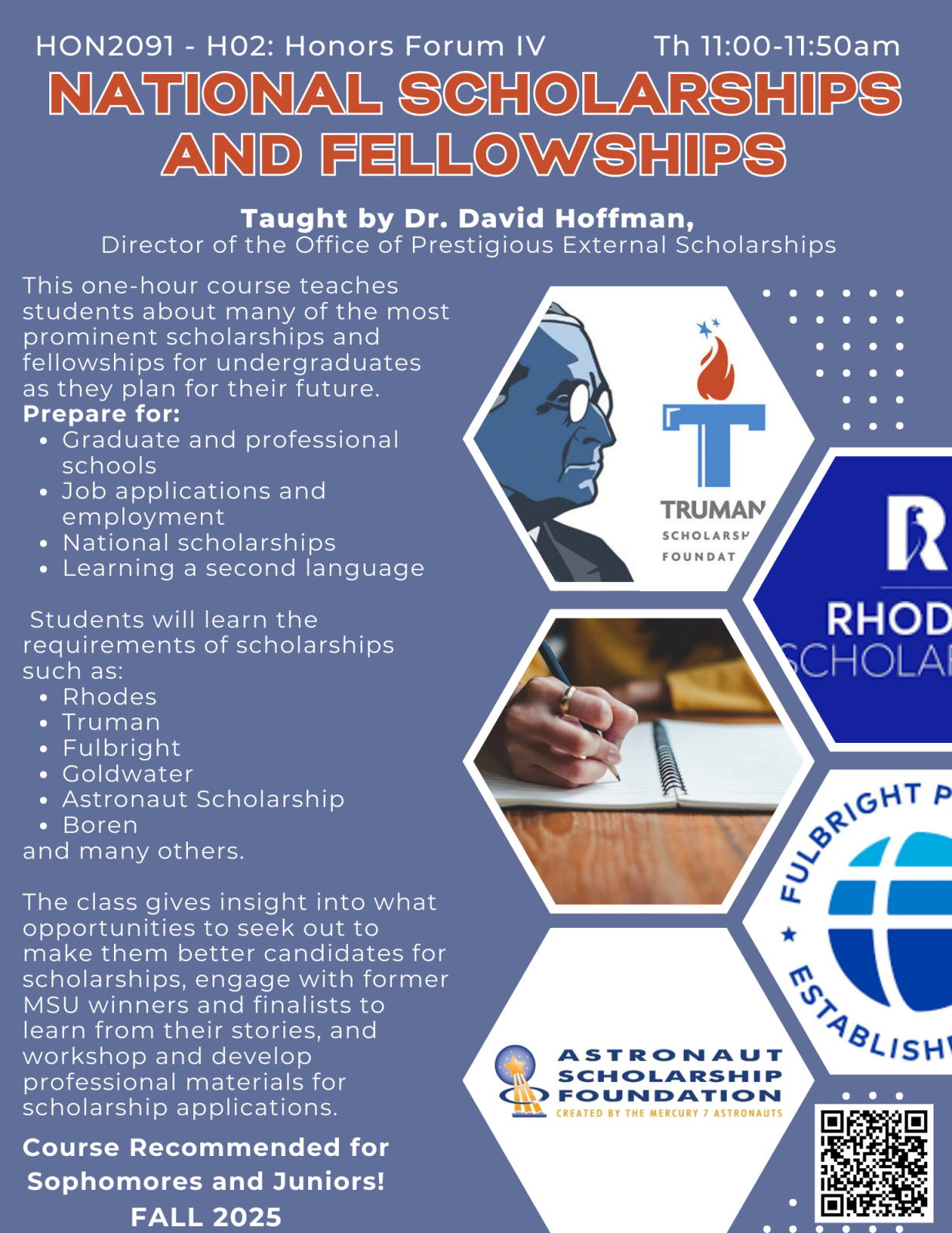
HON 1091-H03: Honors Forum II
Viva Latinoamerica! An Uncensored Guide to the World’s Most Vibrant Culture
Tuesday 2:00 p.m. – 2:50 p.m.
As the majority of Americans, you know about tacos, margaritas, and churros. You can also identify Sammy Sosa or Jennifer López as you watch some of the American TV shows, and by social media, you might be familiar to very distinctive rhythms as tango, merengue, and salsa. As a member of the world community, you have witnessed the phenomenon of globalization and the opportunities it offers. In this course we are embarking in an adventure to learn about the different cultures that form this continent we call America.
We will “virtually” sail in the Caribbean as we learn about the cultural heritage of the Islands; visit the city of Antigua in Guatemala as we explore the Mayan culture; hike the Inca Trail Trek and amaze as we discover Machu Picchu and the richness of the Inca Empire; Finally, we will make a stop in Argentina for the last leg of “our trip”. Then, it is time for you to make your own itinerary. Do you want to go on a research trip to Costa Rica’s rain forest? Be a Pirate in Old San Juan? Marvel at the engineering knowledge needed it in construction of the Itaipu Water Dam? Or, just stroll around Mexico beautiful colonial cities? . . . You will have time for a “discovery trip” of your own.
Taught by Dr. Rosa Vozzo, Instructor in the Department of Classical and Modern Languages and Literatures
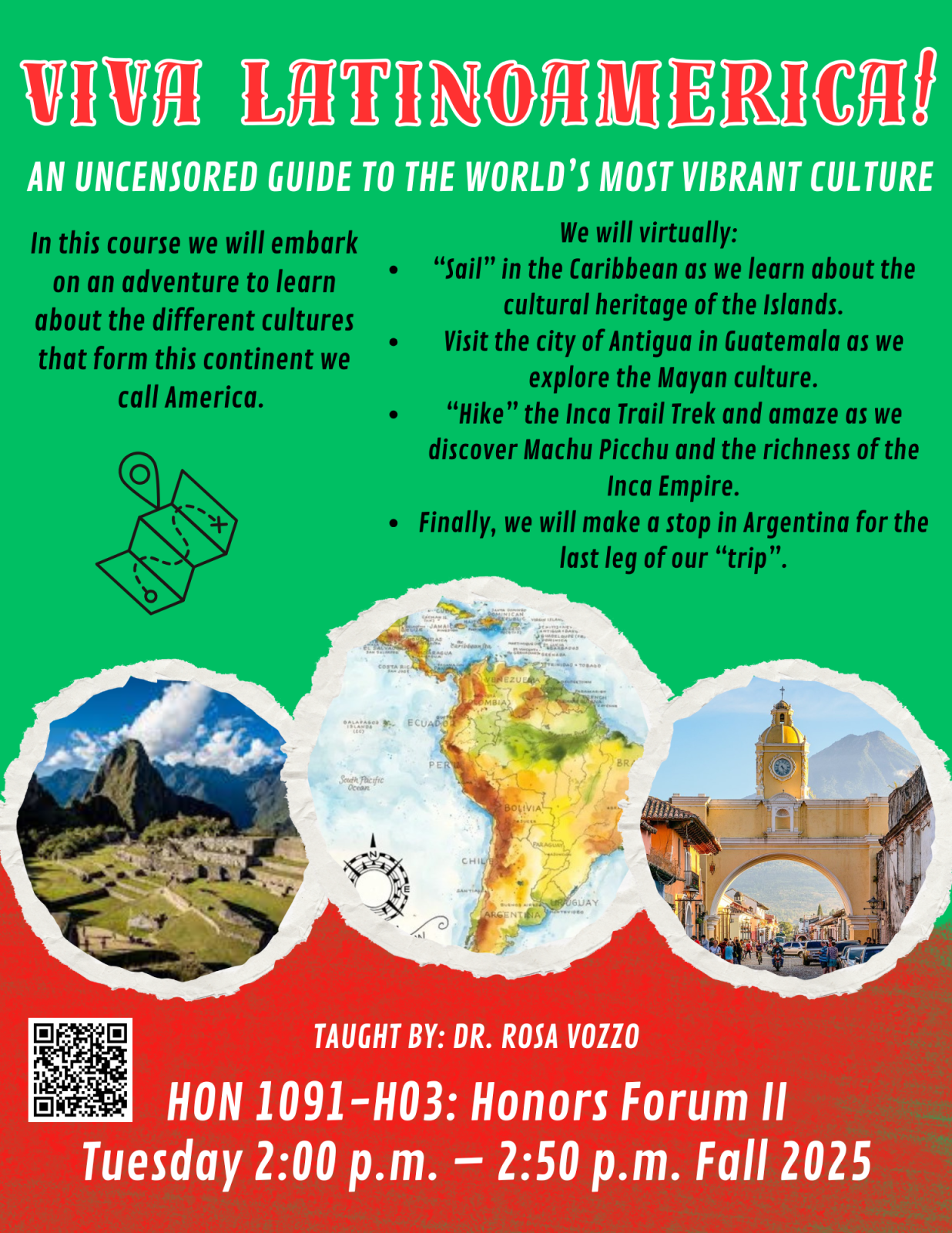
First Year Courses
The following courses are available for first year students
HON 1091-H04: Honors Forum II
Mississippi Blues
Monday 11:00am – 11:50 am
Blues music was a part of everywhere Africans lived in the South, but there was a special type of music known as the Mississippi Delta blues. It has an intense vocal style and strong rhythm that derives from African music. Africans brought their culture with them, their performance practices, and their ways of singing. Enslaved Africans had the field holler and were allowed to maintain work songs because the overseer saw that it made them more productive. Having been forced into this new way of living with the brutality of slavery, it was especially important for them to have some sense of identity and to find a way to celebrate despite the hardships of life in Mississippi. Blues was a form of communication and expression. Blues comes from a terribly sad situation, but the music itself is fun. It makes you want to dance, clap your hands, and sing along. It’s feel-good music even though it comes out of sadness. Although the music originated during slavery times in the earlier 1800s, it did not receive the name “blues” until decades after the Civil War – between 1912 and 1920. Recordings in the 1900s made the genre more popular. Later, blues music birthed rock and roll and influenced musicians such as Jimi Hendrix, The Beatles, The Rolling Stones, and Led Zeppelin. Mississippi was home to a plethora of blues artists such as B.B. King, Robert Johnson, and Howlin’ Wolf. The Mississippi Blues Commission created the Mississippi Blues Trail of more than 100 blues markers across the state to commemorate these figures and landmarks of blues music. If you make a list of the great blues musicians, most of them were born in Mississippi. This class is a survey of selected Mississippi blues musicians and their music.
Taught by Dr. Robert Damm, Professor in the Department of Music
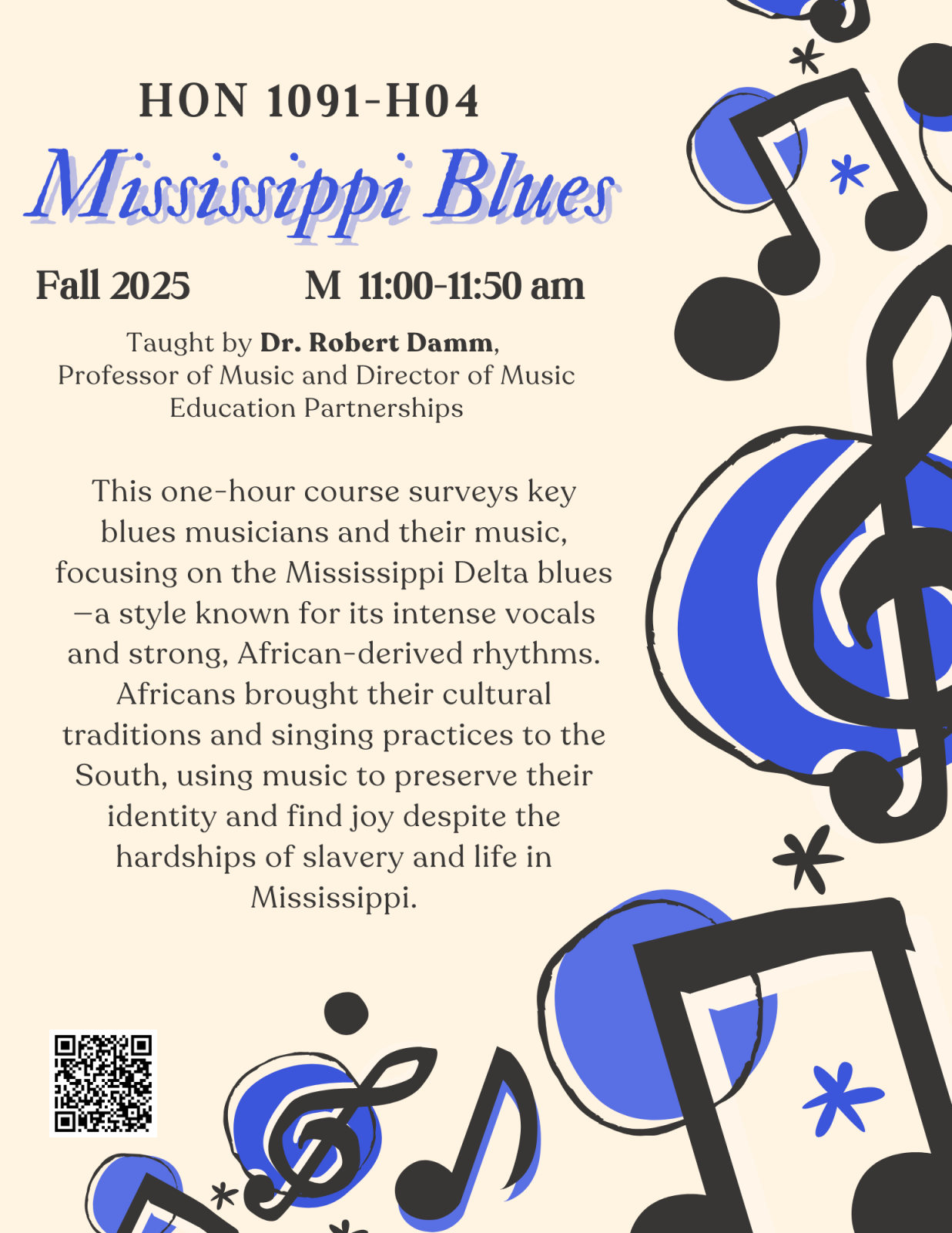
HON 1091-H06: Honors Forum II
Game Changing: Exploring the African American Student Experience at MSU
T 10:00 a.m. – 10:50 a.m.
Integration at Mississippi State looked very different from integration at other state schools in the Deep South. Today, Mississippi State has the highest population of African American students at all Southeastern Conference schools. Using documents and primary source material from University Archives along with guest speakers, this course will explore the African American student experience at MSU beginning with integration and highlighting important milestones up to today. Through their research, students create a capstone project (examples: oral history, timeline, web site, physical Library exhibit) that documents a part of African American history at MSU.
Taught by Jessica Perkins-Smith, University Archivist, Mitchell Memorial Library
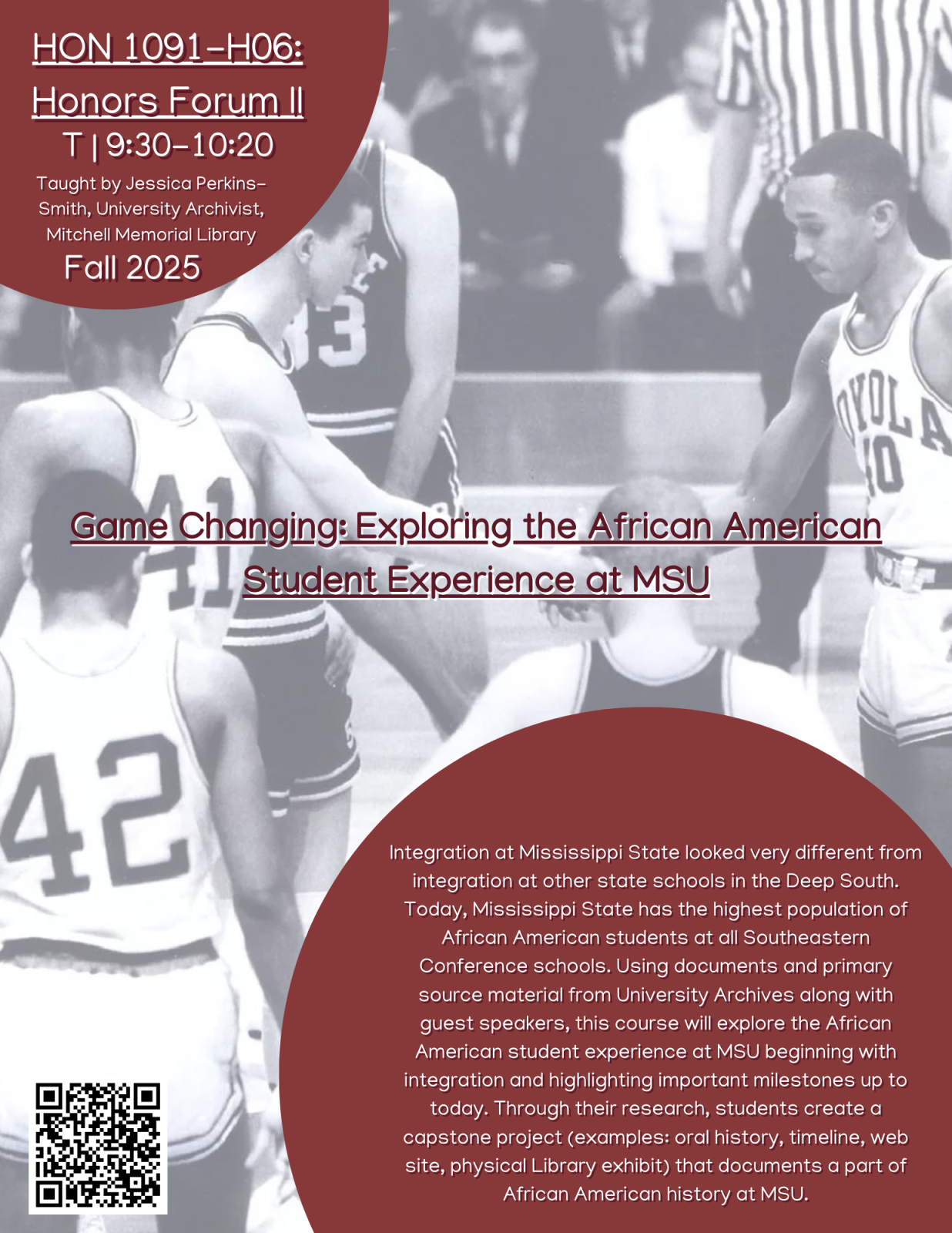
HON 1091. H05 Honors Forum II College Students and Mental Health: Balancing life the Healthy Way
T: 3:30 - 4:30
Taught by Dr. Ericka Akins, Academic Coordinator.
This course is designed for Honor Students who want to learn more about balancing mental health while in college. The course will introduce the students to important topics and current psychological issues related to college students’ mental health. It will introduce them to resources available on campus, as well as some solutions on how to handle every day, college-life stressors. Topics will include: 4 Study habits, Time Management, Balancing School, Relaxation Techniques, Self-Awareness, Burn-out prevention, and more.
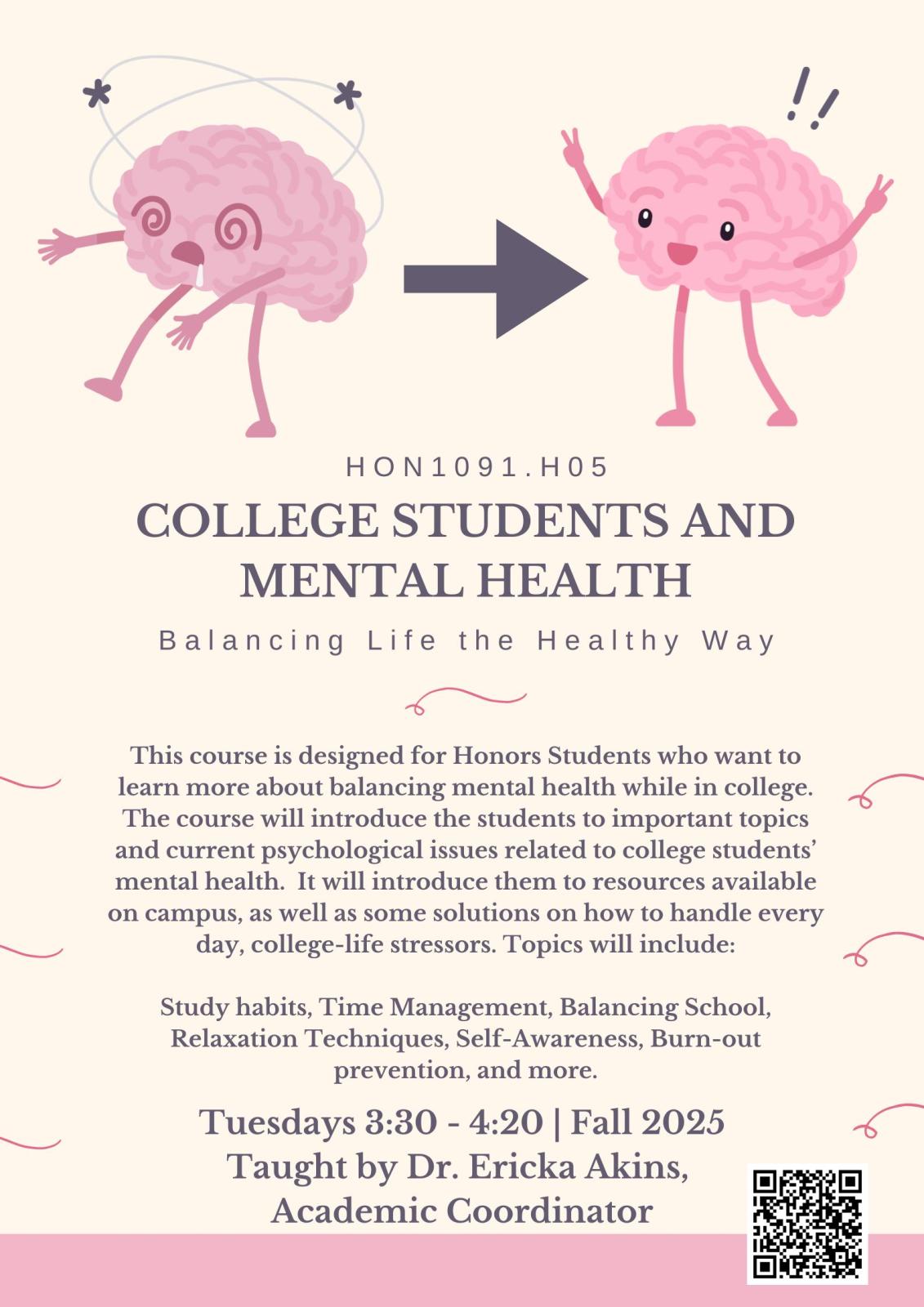
Quest Courses
Our “Quest” courses are offered every semester and are small discussion-based seminars (about 15 students) focused on Great Books, Big Questions, and Big Ideas. Students will read some of the most important texts from the history of literature, philosophy, political science, art, architecture, and music from around the world. Discussions will address questions such as: What is human nature? What is the nature of the divine? What is justice? What is truth? What is love? What is the purpose of art? and How do we know what we know? Students who complete Quest 1 and Quest 2 and earn a grade of C or higher will receive the following General Educations credits: 3 Humanities credits (Quest 1) 3 Social Sciences credits (Quest 2) “S” credit for Fine Arts. (Please note: Any additional 3-credit course must be completed in order to meet total degree hours for your major.)
HON 1163: The Quest Begins (3 credits)
This course examines core texts from Classical Antiquity through the Renaissance. In addition to several short interpretive papers, students will be expected to produce a substantial comparative essay.
HON 1173: The West and the Wider World (3 credits)
This course will examines core texts from the Renaissance to the present. In addition to short interpretive papers, students will be expected to produce a research paper and present their research to the class.